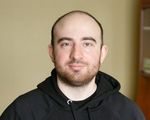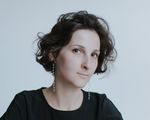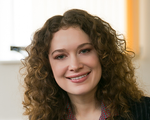About Success Builder
How do you find your place in life? How do you find something to do that both comes naturally to you and makes you happy? The answer is that you have to apply the knowledge you’ve gained from university and from life itself correctly. The Success Builder Project features HSE University graduates who have discovered themselves through an interesting business or an unexpected profession. The protagonists share their experiences and lessons learnt and talk about how they’ve made the most of the opportunities they were given.
Working abroad after the university is both a step forward in your career, as well as a valuable personal experience. HSE alumnus Mikhail Savkin, who is currently the Director of Global Strategy at France’s Schneider Electric, tells Success Builder how easy it is for a consultant to lead a nomadic lifestyle, why HSE should become a subculture, and how to survive in the French corporate world without losing your own cultural identity.
Why did you choose HSE and ICEF, which have largely defined your destiny?
I took economics in high school, and the teacher was from HSE. I remember really liking the subject, and I decided to devote my life to economics. Thanks to these classes, and to a friend who had decided to apply to HSE at the time, my parents and I concluded that it would be best to study economics at a new, modern university. The choice was obvious. After I got into the economics school, we started thinking about ICEF and decided to pay extra in order to receive two diplomas in addition to a top-notch education in English.
That is, you chose ICEF as a way of sharpening your language skills?
That’s right. Plus because of my favourite subject, economics, as well as the opportunity to study abroad. Thanks to ICEF I got a scholarship, and after this I went on to get my master’s from the London School of Economics, which allowed me to increase my knowledge and see what it’s like to live and study there.
Did you assume you’d stay abroad and work?
I went abroad without any expectations as far as a job was concerned, and I returned to Moscow after a year in London. While I was in London, I had an interview with the Moscow office of McKinsey, where I happily worked for three years. After this, McKinsey paid for my MBA, and I went to study in France. I decided to stay in the Paris office of McKinsey. This was a way for me to broaden my horizons – a new country, a new market, and a different culture.
Replanting yourself in new “ground” isn't easy, and France isn’t the simplest place to adapt to.
Can you use your interviewing experience to tell us how employers view ICEF and HSE as far as ‘staff suppliers’ is concerned?
Ever since I first started at McKinsey’s office in Moscow, HSE’s standing has soared, and ICEF’s even more so. Even then, HSE was one of the top universities for headhunters from McKinsey, and now it’s among the leaders. In my case, the London School of Economics played a big part, but the resume and a difficult interview are just the first filter. Afterwards it’s only important how you solve tasks and what impression you make on the client. And an employer looks more at that than other things.
A large part of a student’s knowledge is pure theory. How did you put this theory into practice at McKinsey?
Like Yasin would say at his lectures, HSE is a university that teaches you how to learn. I think this sums up the experience I got at HSE very well. It was not only my knowledge, but more so my ability to learn, that was most important in work and life – more important than knowing about economic theory. With a background like this, you can master a lot of new fields and broaden your professional skills in a specific work environment. Consulting, for example, is the kind of field where you’re constantly learning. You enter into a new industry or country, or you work with a new client, and you know nothing about them a priori, but you have to deal with this issue as quickly as possible, and in just a few weeks you have to formulate an answer to the problem your client posed. This gives your work direction, and it forces you to be flexible, learn, and grow. This is what a good university does.
What did you do at McKinsey when you first started working there?
I started as a business analyst, which is a position for those who don’t yet have an MBA. I did everything sequentially without specialising in one particular industry. My first project was connected with the mining industry, and I headed to the Urals to optimise a fertilizer processing plant. It was a real way to convert theory into practice. Then I dealt with planes, oil and gas, and banks. This is exactly what’s interesting at first – working in different industries with different types of clients. When I moved to the Paris office, I initially spent time getting to know different industries and becoming familiarised with the problems they faced. After some time I focused on what I found interesting, which for me was the industrial sector and problems in operations, such as the optimisation of procurements, production processes, and product design. The results of working with a company’s operating activity are seen immediately, which really motivated me.
How would you compare the job you had in Russia with your job in France? After all, it was at the same company.
The markets are completely different. In France, the market is much more structured, more competitive, and the overall level of competency of middle management is higher than in Russia because of a number of factors, including historic ones. There, there are slightly different economic sectors than in Russia. France has more high-tech, a smaller oil and gas sector, etc. Clients’ management skills are higher, and they present consultants with a clear task. They are largely capable of handling a problem by themselves, but a consultant provides a certain level of support and speeds up the project. They also guarantee an independent point of view, and they bring a broad understanding of the market.
There is more freedom in Russia, however. As a consultant, when you go see a client, he or she knows less. The level of the client team often leaves much to be desired, and I remember oftentimes starting a project by getting together a team ourselves, talking with them, training, and after we left, it was up to them to uphold the changes themselves. Sometimes it’s even necessary to stand in for middle management. The client’s upper management valued this, and in that sense, McKinsey in Russia also serves as a way to prepare staff within the company.
In Russia, conducting business is rather unpredictable. You can carry out a pilot project quickly, but there’s no guarantee there will be sustainable results. This is why after the team of consultants leave, everything returns to square one. In France, if client management agrees with the selected strategy, you can say with high certainty that there’s someone to pass the torch onto.
This mobility in Russia – is it a deeply national quality, metaphysics, or economic instability?
It seems that it all has to do with management’s training. In a technical sense, we have a good school, but the economic approach where the manager is responsible for a company’s performance has been traditionally week. Russia has come a long way in this area since the 1990s, but there’s still work to be done. It’s not a totally accurate comparison, but I’ve also worked in other countries with emerging economies – Northern Africa, for example. There, they have a good level of technical training, and different French protectorates still have strong engineering schools, but the management system isn’t well built or it is deeply bureaucratic. So it turns out that the problem of stability within company management is not a purely Russian problem.
I believe that Russians are real Europeans too. When I lived in Russia, it was always a part of Europe to me, and the fact that I moved hasn’t changed my cultural identity.
Judging by the number of trips you’ve taken, there are a lot of exotic locations in your work.
This is typical for consulting. I enjoyed it. It's experience after all.
Is it easy for a Russian specialist to adapt to life in another country? Is it hard to take and move, find new friends and colleagues, a new life, new food, etc.?
Replanting yourself in new “ground” isn't easy, and France isn’t the simplest place to adapt to. There’s a lot of common ground between our cultures, which made my move relatively painless. I’ve also studied French since I was in school, though. The French also take a different approach towards life and towards work. French people value personal space more, so it wasn’t very easy for me to enter into a conversation with colleagues. There are cultural codes that you don’t take into account, and I never saw any corporate parties after work or fun New Years celebrations like there are in Russia. We got together after work to celebrate, we drank a cocktail, chatted, looked at our watches, and left. The culture here is particularly communicative in the social sense. Being good at holding a conversation is a very valuable quality in France, and my oratory skills are not that amazing.
Colleagues there don’t try to make the arrival of a foreigner smoother in this aggressive, communicative atmosphere? What about corporate principals like team building?
While I was at McKinsey, I couldn’t completely fit into the office lifestyle – the culture there is just too French. And this is understandable. McKinsey’s an international company that upholds the fundamental elements of corporate culture, of course. But each of its offices works with local clients, and the power of the local mentality pulls the focus onto itself. A third of my time at McKinsey was spent on international projects that I worked on with Germans and Dutch colleagues. I have to admit that it was a more comfortable for me to work with them than with the French; they understood that we are all from different cultures. In this sense, the French are tougher. If you can’t handle it, goodbye… During my first months in France, it was hard for me to keep up with ‘coffee break talks,’ where three or so people get together and joke about what they saw in the news. Don’t expect any support in the conversation, especially when a fourth person comes up. You’re already totally out of the ‘circle of trust.’ They pathologically have no desire to integrate anyone into their culture. It’s also not always comfortable for a foreigner in Russia, by the way, except that there’s a buffer from Soviet times where people worship guests from beyond the iron curtain.
Is this how it is with all French companies and the French divisions of multinational corporations? Maybe students should be specially prepared to work in this country? By psychologists?
That's quite a subjective viewpoint, but overall it's a good experience. I went from McKinsey to Schneider Electric and saw the glaring contrast. The company was initially French, but over the last 10 years it has become international in not only a geographic sense – we have offices in Russia, the U.S., China, and 100 other countries – but in a cultural sense as well. I’ve seen many French companies that are represented around the world, and they remain French to the core – language, management, and even the expats that plant a specific corporate culture that derives directly from France. Things aren’t like that at all at Schneider Electric. It’s a truly international company where people speak English, and we have employees from Russia, China, France, etc. People from all over the world hold management positions, and this provides a new standard for communication. My experience with working on international teams is such: everyone’s comfortable because no one is native to the initial corporate culture, and everyone’s equal. And because of that, you feel like you’re in a completely different atmosphere.
Aside from McKinsey’s French-ness, why did you decide to leave your consulting job, and what do you do at Schneider Electric?
I’m currently working on corporate strategy. This is the classical point of entry for a consultant into an industry and a way to get to know the people and the business. This shows you the inside of a company and prepares you for moving into an operational role. I left McKinsey because I decided to stop giving advice and get down to business. I wanted to work in the industry, make decisions, and be responsible for turning projects into reality.
The company Schneider Electric works in green energy and energy-saving technologies; in short, a lot of the company's work has to do with science, environmental science, and technology. Was it easy to switch your mind from consulting to a more applied technology atmosphere?
For me, consulting was a constant way of immersing myself into the technological realm. Issues of conserving energy have really interested me in recent years, which explains my decision. I’ve been working with Schneider Electric for quite awhile and I was very familiar with the company’s work. But my current role at the company isn’t directly technological; it’s at the interface of technology and economics. For example, what value are we creating, where should we invest, where are the interesting markets and clients – these are all issues I deal with. Even in a deeply technical field, the role of a manager as a strategist in the development of a good product always concerns the client’s issues. And this client-focused mentality is one of the transformations that we are currently carrying out within the company. Schneider Electric is developing cool technologies, but they should be aimed at solving clients’ problems. And in this process I gladly delve into an entire host of technical issues.
Do you yourself, now as a European and one of Schneider Electric's managers, support the modern trend of leading a sustainable lifestyle?
This issue is very close to my heart: I ride my bike to work, I don't eat meat, I try to use energy-saving technologies, I sort my trash… Everyone in Europe does the latter though, and this doesn’t require any additional effort. It’s easier to lead a sustainable life here than it is in, say, Russia, where no basic infrastructure exists for this.
Do you feel like a real European?
I believe that Russians are real Europeans too. When I lived in Russia, it was always a part of Europe to me, and the fact that I moved hasn’t changed my cultural identity.
Do you ever hire HSE alumni or somehow communicate with them there in Europe? HSE signifies a specific manner of communicating and thinking, and it has a sort of unspoken and even subcultural history, don't you think?
If alumni come to an interview, why not? But the fact that I’m not in Russia complicates the idea of working with the Higher School of Economics in this sense. It’s a shame that there’s not a French HSE alumni association. There are a lot of graduates here that are in the position to create such a group. Looking back, I am able to compare ‘my’ universities: ICEF, INSEAD, and the London School of Economics. They have different reputations, rolls, ways of communication, contact networks… In this respect, INSEAD is a special community, and McKinsey is a powerful school in and of itself that shapes people for its own system of communication. ICEF is also a close circle of people with its own way of thinking, but this isn’t yet a group for only one type of person. I’ll be honest, in selecting personnel, I won’t give preference to an HSE graduate because of this fact alone. The person is what’s more important for me, and I’ll approve of any person who meets my selection criteria. But HSE should aim to become a sort of ‘brand club’ for graduates – a subculture – so that people understand that they are hiring a certain type of person when they come across someone from HSE. This is exactly what all of the world’s leading universities do.













































































































































